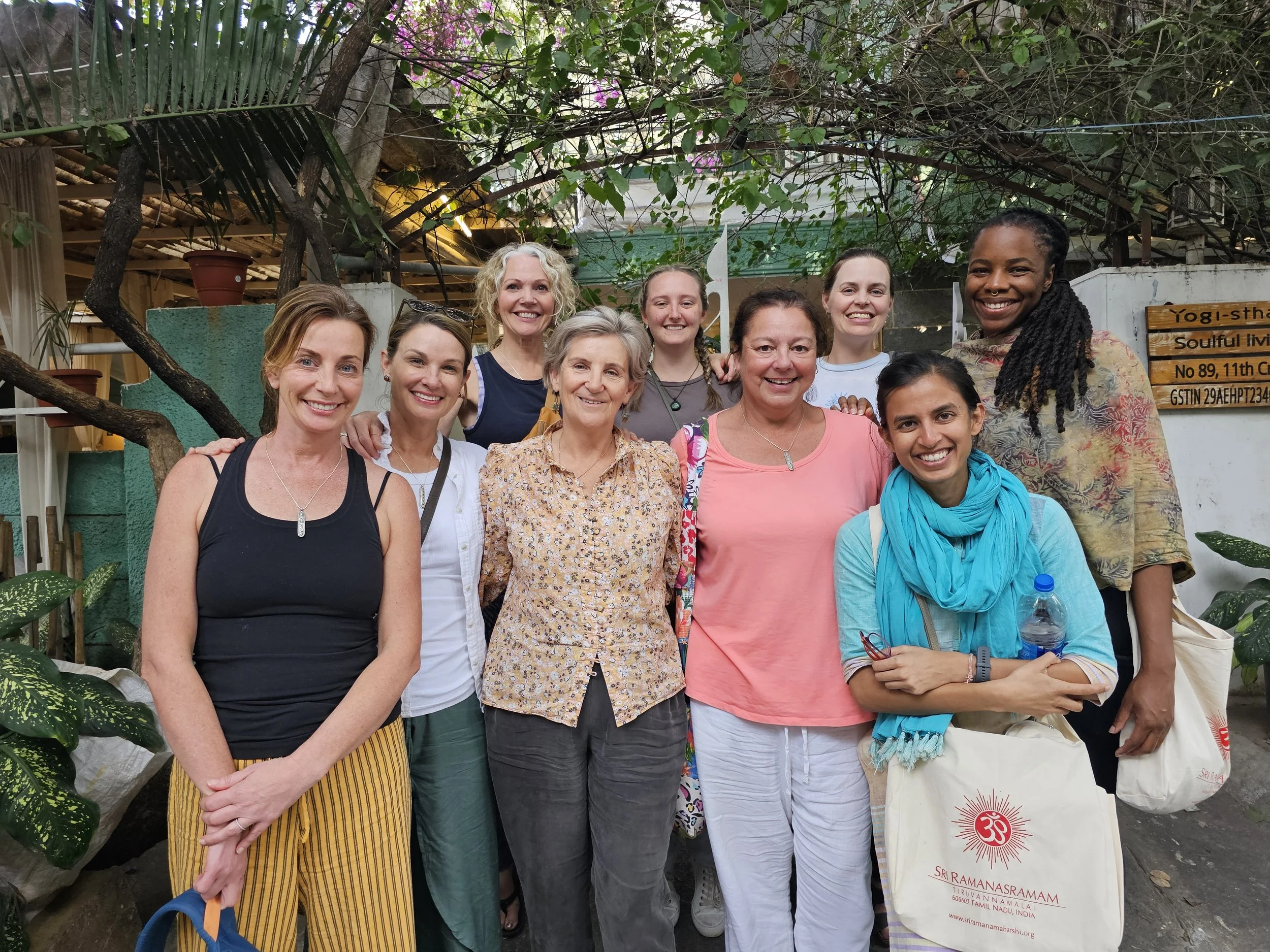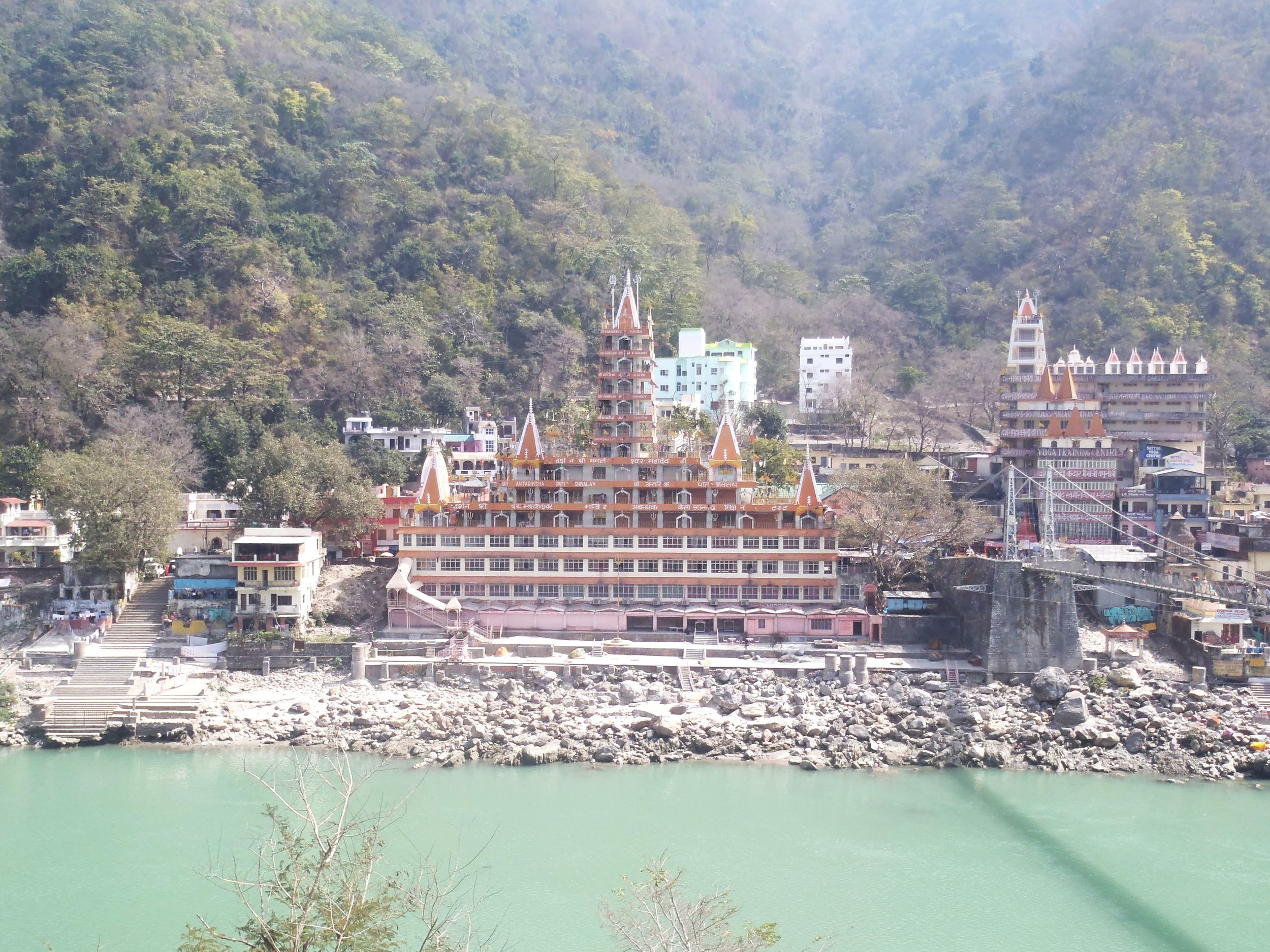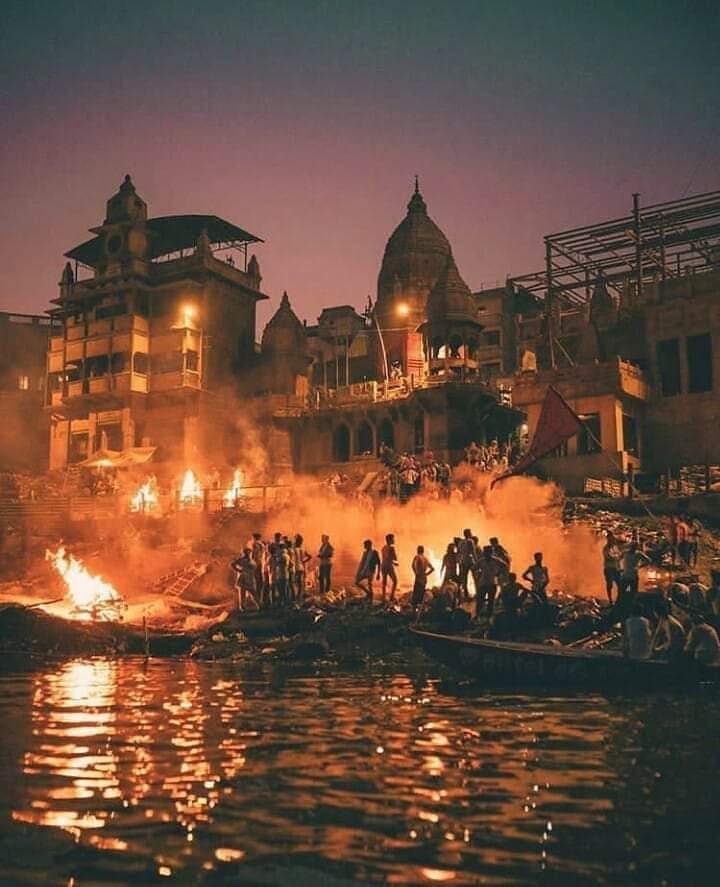We currently don’t have any India retreats planned for 2026.
If you’re interested, email us through the Contact Us page, and we’ll keep you on the email list.
India Retreat 2025: Pilgrimage of Yogis & Saints
Dear Yogis,
We invite you to join us on our next spiritual pilgrimage to India in January 2025!
This pilgrimage is to support our students with personal growth, transformation and spiritual connection as we immerse ourselves in the spiritual richness of India. Our journey will be from January 4 to January 16, 2025, and we will be visiting Delhi, Rishikesh and Varanasi.
This two-week retreat will include daily practices such as yoga, pranayama, meditation, puja, and daily exploration of spiritually significant places where Saints and Yogis have practiced and taught. We will learn about the lives, stories, and teachings of saints and yogis who have walked this path before us, as well as the land which they have practiced on.
We invite you to experience the transformative energy of this ancient land and traditions, and let us support you to step deeper into your spiritual journey.
With joy & excitement
Deepa & Kym
Download Jan 2025 Retreat Brochure
Download our retreat brochure for info on itinerary, our teachers leading the retreat, logistics, costs and how to register.
The Journey
Delhi
Our journey begins in Delhi, where participants will arrive and spend a few days settling in and visiting some of the city's most sacred sites. These locations offer a glimpse into the spiritual diversity and richness of India's capital.
Lotus Temple, Bahá'í Faith: The Lotus Temple, an architectural marvel shaped like a blooming lotus flower, is a Bahá'í House of Worship that welcomes people of all faiths. The Bahá'í Faith, founded by Bahá'u'lláh in the 19th century, teaches the unity of all religions and the importance of universal peace and equality. Bahá'u'lláh's teachings emphasize the spiritual unity of humanity, the elimination of prejudice, and the harmony between science and religion.
Hazrat Nizamuddin Dargah, Sufi & Islamic faith: The Hazrat Nizamuddin Dargah is the mausoleum of the revered Sufi saint Hazrat Nizamuddin Auliya. A prominent figure in the Chishti Order of Sufism (Sufism is a mystical path in Islam), Hazrat Nizamuddin Auliya's teachings centered on love, compassion, and the renunciation of material wealth. The Dargah is a place of deep spiritual resonance, attracting devotees from various backgrounds who come to seek blessings and experience the saint's enduring spiritual presence.
Bangla Sahib Gurudwara, Sikh faith: Bangla Sahib Gurudwara, with its striking golden dome and serene waters of the Sarovar (holy pond), is a major Sikh house of worship. This sacred site is associated with Guru Nanak, the founder of Sikhism, who preached the oneness of God, equality of all people, and selfless service to humanity. The teachings of Guru Nanak emphasize living an honest life, sharing with others, and remembering God at all times.
Exploring Delhi: During our stay in Delhi, you will have the opportunity to reflect, and connect with the spiritual energies of these mystics from different traditions. We will also take time to have fun, go shopping, get oriented and eat delicious food!
Rishikesh
After Delhi, we will travel to Rishikesh by train. This journey is not only a common mode of transport but also a wonderful way to connect with the local experience and witness the diverse landscapes and people of India.
Exploring Rishikesh: Rishikesh, often referred to as the "Gateway to the Himalayas," is a town steeped in spiritual heritage. Nestled in the foothills of the Himalayas and along the banks of the sacred Ganges River, Rishikesh has been a sanctuary for saints and yogic practitioners for millennia. Visitors can enjoy serene walks along the ghats, participate in massage and kirtan sessions, and immerse themselves in the town's tranquil ambiance. The lively markets and local cafes also offer a glimpse into the vibrant culture of the area
Kunja Puri Temple: Perched at an altitude of 1,645 meters, the Kunja Puri Temple is dedicated to Goddess Durga. This temple offers breathtaking panoramic views of the Himalayan peaks and the Doon Valley. It is believed to be one of the 52 Shakti Peethas, where the body parts of the goddess Sati fell. Pilgrims visit this temple to seek blessings and experience the powerful spiritual vibrations that emanate from this sacred site.
Vashishta & Arundhati Guha (Cave): Vashishta Guha is an ancient cave where the sage Vashishta, one of the seven great sages (Saptarishis), is said to have meditated, and his wife Arundhati is said to have meditated close by. Located along the banks of the Ganges, this cave offers a tranquil environment ideal for deep meditation and introspection. The cave's spiritual significance and serene surroundings make it a powerful spot for seekers to connect within.
Neelkanth Mahadev Temple: The Neelkanth Mahadev Temple, dedicated to Lord Shiva, is situated at an altitude of 1,330 meters amidst dense forests. According to Hindu mythology, this is the place where Lord Shiva consumed the poison (Halahala) that emerged from the ocean during the churning of the ocean (Samudra Manthan), which turned his throat blue, giving him the name Neelkanth (the blue-throated one). Pilgrims visit this temple to pay homage to Lord Shiva and experience purification and release of ‘poison’ from within, that occurs when we ‘churn’ ourselves through spiritual practice.
Ganga Aarti on the river bank: One of the most enchanting experiences in Rishikesh is the Ganga Aarti, held at the Triveni Ghat. As the sun sets, devotees gather along the banks of the Ganges to participate in this ritual, which involves the offering of lamps to the river goddess. The aarti is accompanied by the chanting of hymns, the ringing of bells, and the fragrance of incense, creating a mesmerizing and spiritually uplifting atmosphere.
Famous Yogis of Rishikesh: While we are in Rishikesh, we will also learn about the Kriya Yoga and Nath lineage that have played a crucial role in the evolution and preservation of yoga practices. We will explore the teachings of renowned Kriya Yogis such as Babaji and Sri M. We will also hear about other well known Yogis such as Sivananda, and Ananda Mayi Ma, whose lives and teachings continue to inspire spiritual seekers worldwide.
In Rishikesh, you will have ample opportunities to explore, go shopping, get massages, go swimming and deepen your spiritual practice amidst the serene and spiritually charged environment of this ancient town.
Varanasi
From Rishikesh, we will travel to Varanasi in the comfort of a flight. Known as one of the oldest living cities in the world, Varanasi is a place of immense historical and mythological significance. Here, we will mostly explore on foot or by boat along the Ganges River, immersing ourselves in the vibrant spiritual energy of this ancient city.
Exploring Varanasi: Varanasi, also known as Kashi or Benares, is considered the spiritual capital of India. According to Hindu mythology, the city was founded by Lord Shiva, making it one of the most sacred places for Hindus. Varanasi is a hub of spiritual activity, where rituals, prayers, and festivals are a constant part of daily life. Pilgrims from all over the world come to Varanasi to seek blessings, perform rituals, and attain liberation (moksha).
Kashi Vishwanath Temple: The Kashi Vishwanath Temple is one of the most famous Hindu temples dedicated to Lord Shiva. It is believed that a visit to this temple and a dip in the holy Ganges can cleanse one's sins and lead to salvation. The temple has been destroyed and rebuilt several times, reflecting the resilience and enduring faith of its devotees.
Lahiri Mahasaya Samadhi Temple: This temple is dedicated to Lahiri Mahasaya, a key figure in the Kriya Yoga tradition. Lahiri Mahasaya revived the practice of Kriya Yoga and made it accessible to householders. His teachings emphasize the importance of direct spiritual experience and the practice of meditation to realize one's true nature. The Samadhi Temple is a serene place where devotees can meditate and connect with the spiritual legacy of Lahiri Mahasaya.
Ganga Aarti at Dashashwamedh Ghat: The Ganga Aarti at Dashashwamedh Ghat is one of the most spectacular spiritual ceremonies in Varanasi. As the sun sets, priests perform the aarti with lit lamps, chanting hymns, and ringing bells, offering their prayers to the river goddess Ganga. This mesmerizing ritual draws thousands of devotees and tourists each night who come to witness this divine ritual.
Tailanga Swami Math: The Tailanga Swami Math is associated with Tailanga Swami, a renowned saint known for his miraculous feats and deep spiritual wisdom. Tailanga Swami, also known as the "Walking Shiva of Varanasi," lived an ascetic life and is revered for his profound teachings and spiritual powers. The math serves as a place of worship and reflection for his devotees.
Sarnath, Buddha’s first sermon: Sarnath is a significant Buddhist pilgrimage site where Gautama Buddha delivered his first sermon after attaining enlightenment. It is here that the Buddha set in motion the Wheel of Dharma, teaching the Four Noble Truths and the Eightfold Path. Sarnath is home to several stupas, monasteries, and the Dhamek Stupa, marking the spot of Buddha's first sermon. It is a place of deep historical and spiritual importance for Buddhists worldwide.
Manikarnika, Cremation Ghat: Manikarnika Ghat is one of the oldest and most sacred ghats in Varanasi. It is a renowned as a major cremation site, where the fire is said to have been continuously burning for thousands of years. Its name is derived from the legend that Lord Shiva and Goddess Parvati lost an earring (manikarnika) here. Observing the cremation rites at Manikarnika Ghat is a deeply moving experience, offering a stark reminder of the transient nature of life.
Famous Saints of Varanasi: During our time in Varanasi, we will also learn about other saints associated with the city, such as Paramhansa Yogananda, Kabir, and Tulsidas. Paramhansa Yogananda, the author of "Autobiography of a Yogi," brought the teachings of Kriya Yoga to the West. Kabir, a 15th-century mystic poet, and saint, is known for his profound and inclusive spiritual teachings. Tulsidas, a renowned poet-saint, is celebrated for his epic poem, the Ramcharitmanas, which narrates the life of Lord Rama.
In Varanasi, you will have the opportunity to explore these sacred sites, delve into the rich spiritual history, and deepen your connection with the divine in this ancient city.
Concluding Our Spiritual Journey
From Varanasi, retreat participants can travel back to Delhi for their flight home or are welcome to continue their adventures either directly from Varanasi or Delhi. For those looking to extend their journey, there are several nearby destinations worth exploring: The iconic Taj Mahal in Agra and the serene landscapes of Nepal are relatively close and easily accessible from Varanasi. The Golden Temple in Punjab and exploring the palaces in the deserts of Rajasthan are also in North India.
We can provide you with contact information for Sanjay, our reliable travel agent who can assist you with your onward travel plans, ensuring a seamless continuation of your adventure.
We’re excited for you to join us on this spiritual journey through India's sacred citiesI
Yours in Yoga,
Deepa & Kym
-
4th Jan - Pick up Delhi airport, drop to hotel
5th Jan - Lotus temple, Local shopping and exploring in Hauz Khaz village
6th Jan - Bangla Sahib Gurudwara, Hazrat Nizamuddin Dargah, Humayun’s Tomb
7th Jan - Train Delhi to Haridwar, Drive to Rishikesh; afternoon free time
8th Jan - Ganga Aarti - Ram Jhula
9th Jan - Neelkanth temple
10th Jan - Ganga Ceremony
11th Jan - Kunjapuri temple & Vashishta Gufa
12th Jan - Flight to Varanasi
13th Jan - Sarnath, Ganga Arti
14th Jan - Lahiri Mahasaya temple, Tailanga Swami math
15th Jan - Kashi Vishwanath temple, Dinner celebration
16th Jan - Travel to Delhi, onward travel or return home
-
You will be supported and guided by two of the teachers at Yogic Wisdom, Kym Lakshmi Mcdonald and Deepa Gupta.
Kym Lakshmi McDonald lives in Newcastle, Australia and is the founder of Yogic Wisdom. She has been taking groups to India for spiritual retreats for over 15 years, supporting them in their spiritual and yoga journeys. During her 18-year journey with yoga and other healing modalities, Kym has been drawn to Krishnamacharya’s holistic approach, moving beyond just the physical body to heal and help the whole person. With this in mind, Kym founded Yogic Wisdom and the Karma Yoga Foundation where she and the faculty combine the art and science of Yoga Therapy and Yoga to share the wise ancient teachings of yoga.
Deepa Gupta lives in Truckee, California and is the new owner and principal teacher at Yogic Wisdom in Australia, and a teacher at Namaste Yoga studio in Truckee. Deepa has organized and helped run yoga retreats in India and the US since 2018. She is passionate about helping people with a western background understand Indian culture and find their feet as they experience India’s uniqueness. Deepa’s first call to Yoga was through Karma Yoga, where she has worked on issues of climate change, development, and democracy for the last two decades. Her second call was to Hatha and Kriya Yoga, in which she has practiced for 15 years.
-
Please note that spots are limited and will be given on a first come first serve basis, a deposit of $2,400AUD or $1600USD is required to secure your spot. The remaining amount is due on 24th November 2024 unless you are on a special payment plan.
For those of you who wish to benefit from the early bird discount, the deposit will be due by 1st October.
Instructions on how to make the payment will be provided once you email us with your interest to register. To register please email Kym on info@yogicwisdom.com.au (for Australians) or email Deepa on info@yogicwisdom.co (for Americans).
-
The retreat cost amount includes accommodation, breakfast, internal transfers, activities and teaching fees.
Aussies: Total retreat cost for Australians is approx. between $4950 AUD. For those who want a single room (non-sharing), it’s an additional approx. $1,400AUD.
Americans: Total retreat cost for Americans is $3,400 USD. For those who want a single room (non-sharing), it’s an additional $950 USD.
Last date for early bird discount is 1 October.
Please note, this fee does NOT include your flight to India. To learn more about flight options please read below.
If cost is a prohibiting factor, please let us know so we can discuss payment plan options.
-
Participants are required to book their own flights in and out of India. We request all participants to arrive into Delhi by the evening of Saturday, January 4th 2025, and depart from Delhi on the evening of Thursday, January 16th 2025. You are welcome to arrive earlier or leave later if you wish to plan your own travel before or after the retreat. You may also depart from Varanasi if you wish, in which case we will deduct the cost of the flight back to Delhi.
Please purchase the flight that is most suitable for your budget and comfort.
-
All travelers will need to apply for an e-visa at least one month prior to travel to India. There also may be Covid travel requirements such as proof of vaccination, uploading a Covid Self declaration form, and providing Covid PCR test results. After you register, we will provide you with instructions on how to file for an e-visa and how to fulfill covid travel requirements.
-
Immunization shots are a personal choice, and we encourage you to make your decision in consultation with your doctor. The WHO recommend the following vaccinations for India: hepatitis A, hepatitis B, typhoid, cholera, yellow fever, Japanese encephalitis, rabies, meningitis, polio, measles, mumps and rubella (MMR), Tdap (tetanus, diphtheria and pertussis), chickenpox, shingles, pneumonia and influenza.
While the likelihood of contracting such diseases is low, these are precautionary measures to help your travel to India to be as smooth as possible.
-
Traveling to a new country can bring concerns around safety, especially when the country is quite different from places we are familiar with.
We have designed the program with your safety in mind. We have selected hotels with high ratings in regions that are considered to be safe. The teachers will accompany you throughout the trip, and we will be providing guidance about local customs and guidelines on how to safely navigate locations we will be visiting.
Once you register you will receive further information on safety, and relevant contact details.
-
For further questions or to register you can contact:
Australia: Kym Mcdonald via email or text: info@yogicwisdom.com.au, 0410-545-502
USA: Deepa Gupta via email or text: info@yogicwisdom.co, 202-352-7873
-
If you decide to cancel your attendance for the retreat before 1st Nov 2024, you will be charged a $600AUD / $500 USD non-refundable fee, and the remaining amount will be refunded.
If you cancel after 1st November, you will be charged 50% of the retreat cost. If you cancel after 4th of December (1 month prior to the retreat), we will keep the amount as we will have already paid for all the hotels, transportation etc.
We will consider each situation on a case by case basis, and in the case of a serious emergency will do our best to refund as much of the fee as possible (based on what we are able to get back from the hotels etc).



























